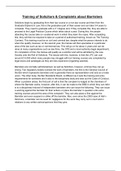Training of Solicitors & Complaints about Barristers
Solicitors begin by graduating from their law course or a non-law course and then from the
Graduate Diploma in Law, this is the graduation part of their career and can take 3-4 years to
complete. They need to graduate with a 2:1 degree and, if they complete this, they are able to
proceed to the Legal Practice Course which takes about a year. During this, the people
attending the course take on vocational work in which they learn the ropes. After completing
this, they will then be required to take on a period of authorised training, known as The Training
Contract. This training must be on civil and criminal law, despite what the person intends to do
when the qualify, however, on the second year, the trainee will then specialise in a particular
area of the law such as tax or commercial law. This will go on for about 2 years and can be
done at many organisations such as law firms, the CPS and a local authority (legal department).
On completion of this, the trainee will qualify as a solicitor and will be admitted by the Law
Society onto the Roll of Solicitors. The issues with this, however, is that the LPC can cost
around £14,000 which many people may struggle with but training courses are completed by
legal execs and paralegals as they are less expensive (regarding salaries).
Barristers are normally self-disciplined, as well as Solicitors, however, at times they can go
wrong. Two regulatory bodies oversee the work of barristers, the first is the General Council of
the Bar which represents barristers and is generally there as representation and acts as a trade
union. The other body, the Bar Standards Board, is different as it sets the training and entry
requirements for barristers and it also is the disciplinary body and sets out the Code of Conduct.
When a problem arises, the first port of call is that the complaint is lodged at the chambers of
where the Barrister works, however, after this, it can be made to the BSB in which they can refer
is to a disciplinary tribunal of independent barristers who can issue the following. They can issue
a warning against the barrister for their actions or place the barrister in question onto extra
training courses around the area of the complaint. They can also place a fine against the
Barrister and even suspend or strike off the barrister. Also, ever since the 2000 case of Hall v
Simmons, a barrister can be sued for negligence for the work they carry out in court and in
relations to any written advice/opinions that they give.





